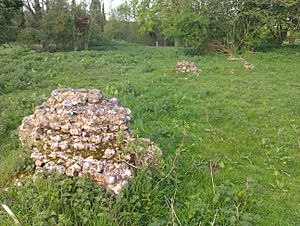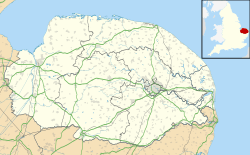Hempton Priory facts for kids
Quick facts for kids Hempton Priory |
|
|---|---|
| The Priory Church of Saint Stephen, Hempton | |

Priory ruins, 2012
|
|
| 52°49′N 0°50′E / 52.82°N 0.83°E | |
| Location | Hempton, Norfolk |
| Country | England |
| Denomination | Roman Catholic |
| Architecture | |
| Years built | 1135 |
| Demolished | 1536 |
Hempton Priory was an old monastery in Hempton, Norfolk, England. It was also sometimes called Fakenham Priory or Damsend Priory.
A priory is a type of monastery, which is a building where monks or nuns live and follow religious rules. Today, not much of the original priory buildings can be seen above ground. However, you can still spot large earthworks, which are changes in the shape of the land. Some old foundations are also part of newer buildings.
Contents
History of Hempton Priory
How the Priory Started
Hempton Priory began as a hospital before the year 1135. A hospital back then was a place that offered care for the poor and sick, often run by religious groups. It was founded by Roger de St Martin, who was the lord of the Hempton area, along with Richard Ward.
Later, this hospital became a priory for the Augustinian Canons Regular. These were groups of priests who lived together under strict religious rules. Richard Ward became the first leader, known as the prior.
Royal Grants and Income
King John gave Hempton Priory the right to hold a fair. A fair was a big market event where people could buy and sell goods. Over time, the priory was allowed to hold three fairs a year!
The priory also claimed the right to hold a market every Tuesday. However, by 1854, this market was no longer happening. In 1535, the priory earned about £32 14s. 8d. from its lands. This was a good amount of money at the time.
Later Years and Closure
Even after it became a priory, the building continued to be used as a hospital for people in need after the year 1200.
However, in 1536, the priory was taken over by the King. This happened during a time when many monasteries in England were closed down. The land was later given to Sir William Fermer in 1545 or 1546. Eventually, the land became the property of Viscount Townshend.
Priory Seal
The priory had its own special seal, which was used to make official marks on documents. This seal was shaped like an oblong and made of red wax.
It showed an image of Saint Stephen standing under an arch, with two candles on either side. The words on the seal said 'SIGILLUM COMMUNE SANCTI STEPHANI DE HEMPTON'. This means 'The Common Seal of Saint Stephen of Hempton'. Below this, there was another image of a person kneeling under an arch.
 | Lonnie Johnson |
 | Granville Woods |
 | Lewis Howard Latimer |
 | James West |


